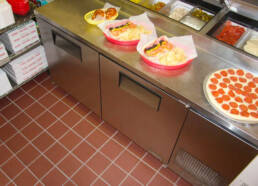Don't use this type of grout for Commercial Kitchens

Single component grouts that can be scooped directly from the bucket and applied to tiles have become increasingly popular over the last 10 years. These ready to use grouts are great for many applications, but should never be used in commercial kitchens even if the advertisement says they offer ‘all of the benefits‘ of epoxy grout. They aren’t epoxy grouts and the differences are most obvious in a commercial kitchen setting. All of them exclude environments where harsh chemicals are used in their Technical Data Sheet.
Quarry tile is the most popular floor covering for commercial kitchens because it is very resistant to anything you can throw at it. The grout you pair with the quarry tile needs to be equally resistant to harsh cleaners, grease, and other conditions found in this environment. The enzymatic cleaners typically used for commercial kitchens are designed to digest fat and grease particles with enzymes. While the best practice is to then rinse these cleaners from the floor, often that is not done. This creates oleic acid that can damage cement grout, standard epoxy grout, and single component grouts.
For commercial kitchens, Metropolitan recommends the use of 100% solids epoxy grouts designed specifically for this type of application. Generally these are advertised as industrial epoxy grouts. Common grouts in this category include Kerapoxy IEG from MAPEI, Spectralock 2000 IG from Laticrete, and CEG-IG from Custom Building Products. There are others available as well. These grouts take practice to install as they are often stiffer and more challenging to clean than standard epoxy grouts. However, they are much easier to work with than the old technology, furan grouts. When in doubt, consult the installation products manufacturer to get their grout recommendation for your installation.

